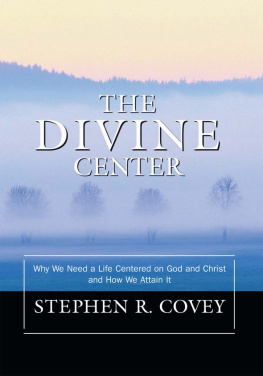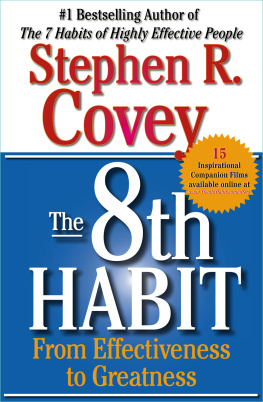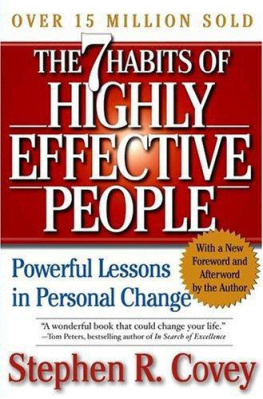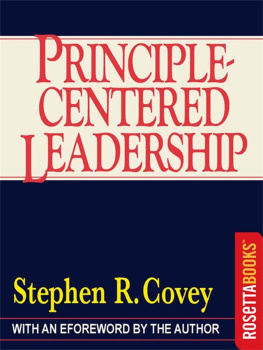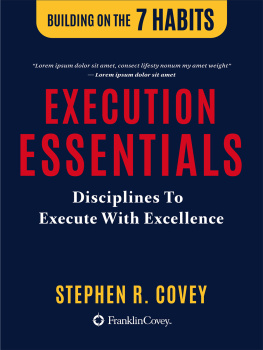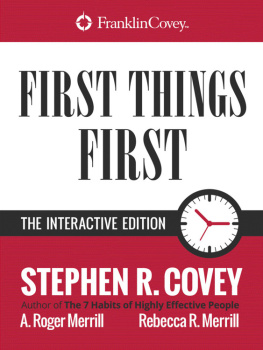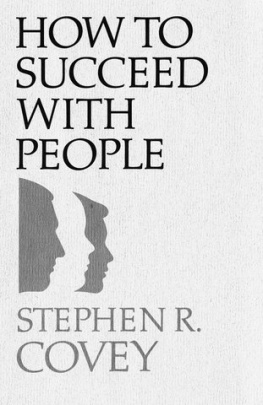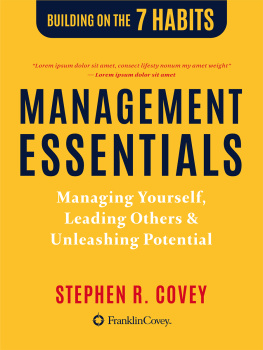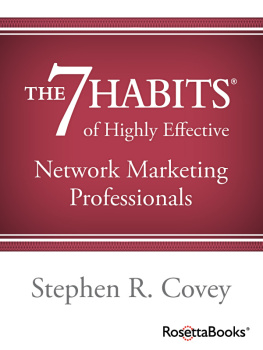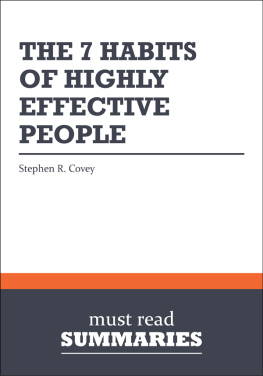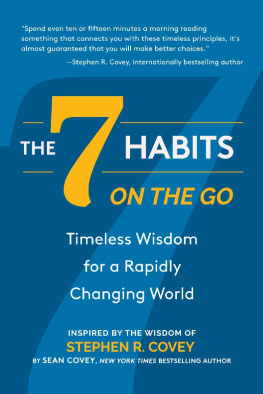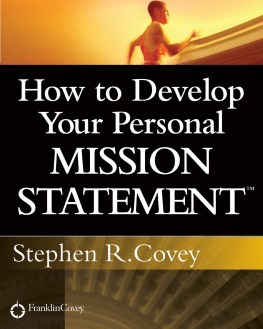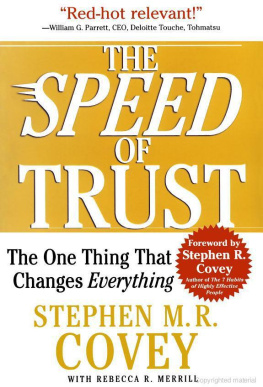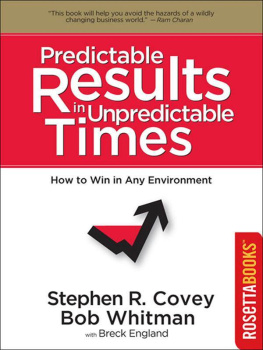Stephen R. Covey - The Divine Center
Here you can read online Stephen R. Covey - The Divine Center full text of the book (entire story) in english for free. Download pdf and epub, get meaning, cover and reviews about this ebook. year: 1982, publisher: Deseret Book Company, genre: Religion. Description of the work, (preface) as well as reviews are available. Best literature library LitArk.com created for fans of good reading and offers a wide selection of genres:
Romance novel
Science fiction
Adventure
Detective
Science
History
Home and family
Prose
Art
Politics
Computer
Non-fiction
Religion
Business
Children
Humor
Choose a favorite category and find really read worthwhile books. Enjoy immersion in the world of imagination, feel the emotions of the characters or learn something new for yourself, make an fascinating discovery.
- Book:The Divine Center
- Author:
- Publisher:Deseret Book Company
- Genre:
- Year:1982
- Rating:4 / 5
- Favourites:Add to favourites
- Your mark:
- 80
- 1
- 2
- 3
- 4
- 5
The Divine Center: summary, description and annotation
We offer to read an annotation, description, summary or preface (depends on what the author of the book "The Divine Center" wrote himself). If you haven't found the necessary information about the book — write in the comments, we will try to find it.
The Divine Center — read online for free the complete book (whole text) full work
Below is the text of the book, divided by pages. System saving the place of the last page read, allows you to conveniently read the book "The Divine Center" online for free, without having to search again every time where you left off. Put a bookmark, and you can go to the page where you finished reading at any time.
Font size:
Interval:
Bookmark:


All rights reserved. No part of this book may be reproduced in any form or by any means without permission in writing from the publisher, Deseret Book Company, P.O. Box 30178, Salt Lake City Utah 30178. This work is not an official publication of The Church of Jesus Christ of Latter-day Saints. The views expressed herein are the responsibility of the author and do not necessarily represent the position of the Church or of Deseret Book. Deseret Book is a registered trademark of Deseret Book Company.
First published in hardbound 1982
First published in paperbound 2005
Library of Congress Catalog Card Number: 82-73496
ISBN 0-88494-471-9 (hardbound)
ISBN 1-59038-404-0 (paperbound)
Printed in the United States of America 18961
R. R. Donnelley and Sons, Harrisonburg, VA
10 9 8 7 6
WHY WE NEED A LIFE CENTERED ON GOD AND CHRIST AND HOW WE ATTAIN IT
To Sandra and our dear children
Cynthia
Maria
Stephen
Sean
David
Catherine
Colleen
Jenny
Joshua
each so satisfying and fulfilling to me
For many years I have felt and seen the need for an organizing principle in life, a principle that would enable us to get a handle on thingsunravel confusion, clarify relationships, get to the bottom line fast. The principle would have to be simple but not simplistic. It must also be capable of serving as the directing or controling center of a persons life.
This book is about that principle. I excitedly wrote the first draft over five years ago. Since then many synchronistic learning experiences have spurred considerable rewriting and reworking of the material. My central purpose is to invite readers to examine their faith and lives from a fresh perspective or angle, and consequently to deepen their commitment to the gospel of Jesus Christ. The approach is essentially inductive, that is, it starts with the specific (the problems) and moves to the general (suggested solutions).
As far as content is concerned, while I am fully responsible for what is written here, I acknowledge with a deep sense of gratitude and reverence the influence, encouragement, inspiration, and help of many individualstruly too many to mention by name. These include family and friends, missionaries from the Irish Mission and elsewhere, Church leaders, mission and stake leaders, students, counselees, managers, professional colleagues, secretaries, editors, publishers, and good people in and out of the Church all over the world.
As to the manuscript and the book design, I must mention with appreciation and respect three people by name: Shirley Smith, for her loyal and able second-mile secretarial/managerial services; Michael Graves, for his splendid artistic sense and touch; and George Bickerstaff, senior editor at Bookcraft, for his unique talents, superb editorial assistance, and complete integrity.
Chapter 1
For with thee is the fountain of life: in thy light shall we see light. (Psalm 36:9.)
This is a book about attaining the one perspective that puts everything else in proper perspective. In recommending this perspective I advocate a specific spiritual approach to life and its problems, an approach which combines solid gospel principles and practices with some of our modern understandings about human motivations and relationships. The primary focus of the book is behavior rather than doctrine. I suggest ways to achieve the perspective and indicate the transcendent benefits to be expected from it.
Before I can attempt to do this, however, I must be sure that you understand a major concept that leads up to it. And by understand, as I have just used the word, I am not speaking merely of an intellectual appreciation. For this reason I am inviting youurging you, in factto have an experience. Have this experience right now, before you get any further into this book.
This experience is a very simple one. It will take only a few minutes but it is vitally important if you are really to understand the essential approach to the message of this book.
Now, if you choose to keep on reading rather than to have this experience, you will still come to understand intellectually the point being made, but you wont understand it emotionally as well. If you feel the point, however, you will not forget it, and this could have a significant impact for good upon you as you read the bookand perhaps for your entire life. So I once more encourage you to make the small effort required to have this important learning experience.
Here is the experience:
Step 1: Turn to page 49 of this book and look at it for a few seconds.
Step 2: Ask someone else to take the book and turn to page 85 and look at it for a few seconds. Dont look at that page yourself and dont let the other person look at page 49.
Step 3: Now together turn to page 244 and look at that.
Step 4: Each of you try to convince the other person about what you see. Dont ask questions, just try to persuade the other person how right you are in this matter.
Step 5: Still looking only at page 244, continue your discussion with each other, and if you havent by this time come to see each others point of view, try to do so. Each of you shift your purpose from selling or persuading to one of understanding. Continue to communicate until both of you can see each others point of view.
Last step: Now that you have seen each others point of view, briefly discuss what happened and why. Then both of you look at pages 49 and 85 to understand the initial experience which essentially conditioned or programmed your respective minds.
Now, it may be that by chance you had already seen one or more of these pictures or had had this experience. If so, give the experience to two others to whom it is new, having them proceed carefully through the outlined steps. Do this too if the initial programming picture didnt take with you (and inexplicably it doesnt with about 10 percent of those who saw the old woman on page 85 and 5 percent of those who saw the young girl on page 49.)
Whether you have the experience yourself or observe others having it, you will get the point: prior experiences have great impact on present perceptions, and these perceptions significantly affect or even determine our feelings, our communication, and our behavior.
You may think the lesson of this simple experience is completely self-evident. Whether it is or not, I suggest that its implications are staggeringly profound and far-reaching.
I first had the experience in the fall of 1955, in an administrative practices class at the Harvard Graduate School of Business. It impressed me then, but the point the instructor made about perception focused primarily on the importance of communicating in such a way as to understand other peoples points of view. In effect, I compartmentalized the experience, limited it primarily to that application. For the next twenty years I used these pictures scores of times in various contexts all over the world, through this experience teaching people important and fairly obvious lessons in interpersonal communication.
Several years ago I began to realize that there was an intrapersonal (within self) dimension also to this concept. I saw that the effects of our experience-induced perception do not stop at our communication with others. That area is, so to speak, the tip of the iceberg. Much more importantly, I came to realize that
Font size:
Interval:
Bookmark:
Similar books «The Divine Center»
Look at similar books to The Divine Center. We have selected literature similar in name and meaning in the hope of providing readers with more options to find new, interesting, not yet read works.
Discussion, reviews of the book The Divine Center and just readers' own opinions. Leave your comments, write what you think about the work, its meaning or the main characters. Specify what exactly you liked and what you didn't like, and why you think so.

